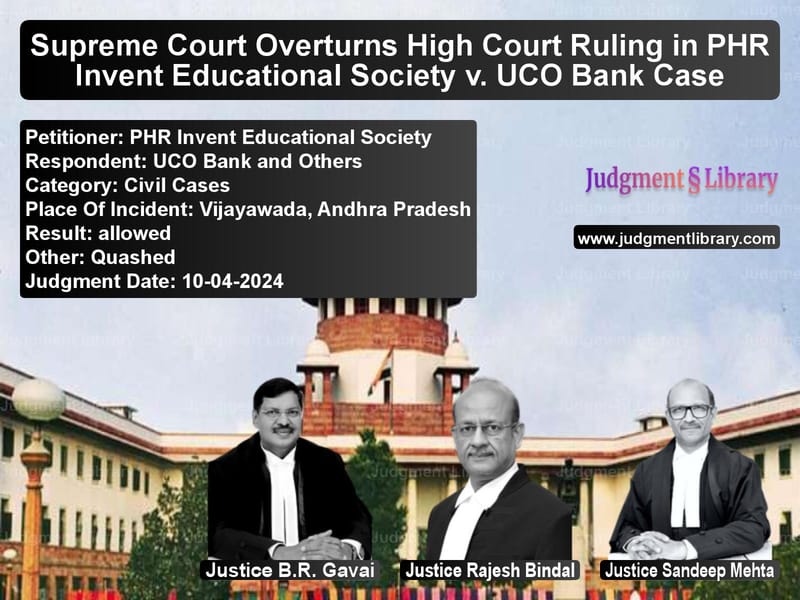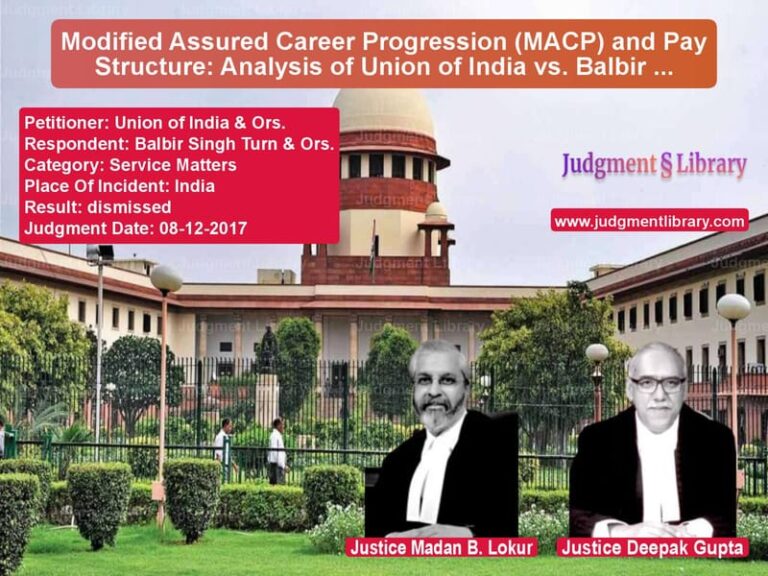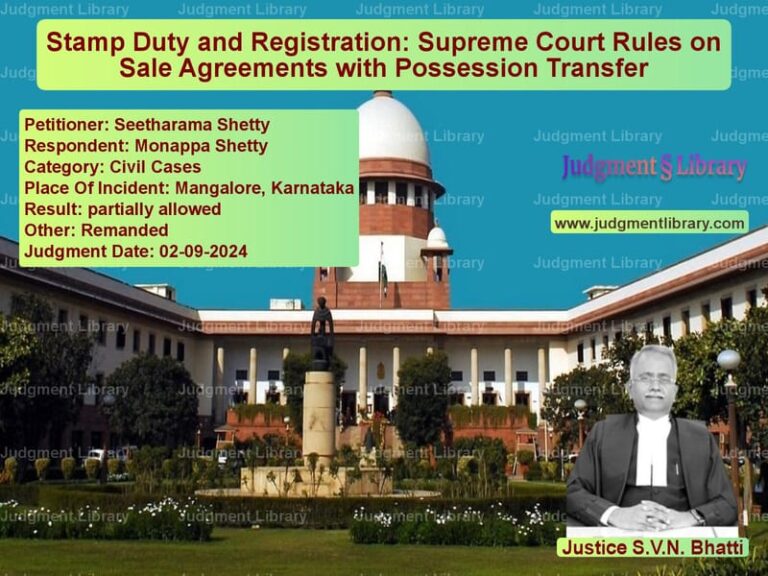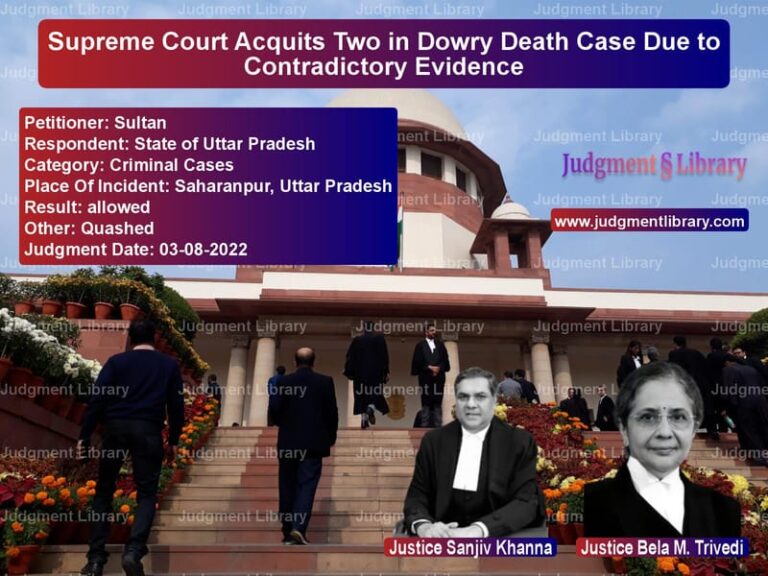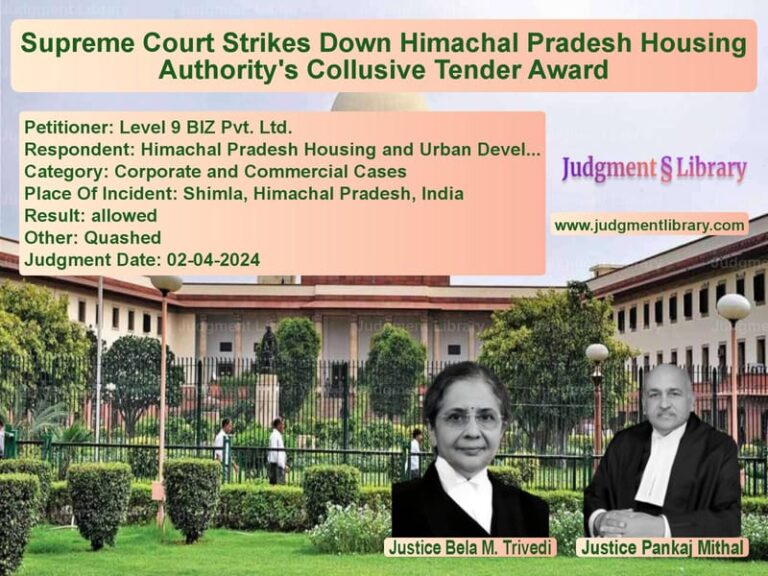Supreme Court Overturns High Court Ruling in PHR Invent Educational Society v. UCO Bank Case
The Supreme Court of India recently delivered a significant judgment in PHR Invent Educational Society v. UCO Bank & Others, setting aside a Telangana High Court order that had directed the Debts Recovery Tribunal (DRT) to reexamine a case under the Securitization and Reconstruction of Financial Assets and Enforcement of Security Interest Act, 2002 (SARFAESI Act). The ruling highlights crucial legal principles related to alternative remedies, auction sales, and the rights of financial institutions and borrowers in debt recovery proceedings.
Background of the Case
The case originated from a loan dispute between Dr. M.V. Ramana Rao (the borrower) and UCO Bank. The borrower had availed a loan from the bank and mortgaged four properties in Vijayawada, Andhra Pradesh, as collateral security. However, due to default in loan repayment, the bank initiated proceedings under the SARFAESI Act.
Following the borrower’s failure to settle dues, UCO Bank issued an Auction Sale Notice on September 2, 2017, to recover outstanding amounts through the sale of mortgaged properties. The auction was conducted on December 14, 2017, where PHR Invent Educational Society (the appellant) emerged as the highest bidder with a bid of Rs. 5,72,22,200. The appellant deposited 25% of the bid amount, including the Earnest Money Deposit.
Legal Challenges and Procedural History
- The borrower filed a Securitization Application (S.A.) No. 1476 of 2017 before the DRT challenging the auction.
- On the same day as the auction (December 14, 2017), the DRT passed an interim order declining to interfere with the sale but directed UCO Bank not to confirm the sale if the borrower deposited 30% of outstanding dues in two installments.
- The borrower failed to make the deposits, leading to the automatic vacation of the stay.
- The appellant deposited the balance auction amount of Rs. 4,29,16,650 by December 28, 2017.
- The borrower later proposed a One-Time Settlement (OTS), which the bank declined.
- On September 21, 2020, the DRT dismissed S.A. No. 1476 of 2017 as withdrawn after the borrower’s counsel stated that an out-of-court settlement had been reached.
- After the case was withdrawn, the bank confirmed the auction sale in favor of the appellant and issued a Sale Certificate on November 2, 2020, followed by property possession and registration on November 11, 2020.
Despite the sale being completed, the borrower later sought to restore the dismissed securitization application through M.A. No. 97 of 2020, arguing that the DRT had improperly allowed the case to be withdrawn. However, the DRT rejected this request on February 2, 2021. The borrower then filed a writ petition before the Telangana High Court, which, in an order dated February 4, 2022, set aside the DRT’s decision and directed it to proceed with the case.
Supreme Court’s Ruling
The Supreme Court, in its detailed judgment, overturned the High Court’s ruling, citing several key legal principles:
- Alternative Remedy Rule: The Court reiterated that when a statute provides a specific remedy (such as an appeal under the SARFAESI Act), parties must first exhaust those remedies before approaching the High Court under Article 226 of the Constitution.
- Finality of Auction Sales: The Court held that once an auction sale is confirmed and property registration is completed, it can only be challenged in exceptional circumstances such as fraud or collusion. In this case, no such claims were substantiated.
- Conduct of the Borrower: The Court criticized the borrower’s conduct, noting that he had failed to deposit the required amount at multiple stages, misrepresented the status of the case to withdraw it, and later sought to reopen proceedings despite the sale being finalized.
Justice B.R. Gavai, writing for the bench, observed:
“The High Court has grossly erred in entertaining and allowing the petition under Article 226 of the Constitution. The borrower had adequate statutory remedies available under the SARFAESI Act, which he failed to pursue. Judicial intervention should be exercised with caution, especially when an alternative remedy exists.”
Judicial Precedents Considered
The Supreme Court relied on several precedents to reinforce its decision:
- United Bank of India v. Satyawati Tondon (2010) – Held that High Courts should refrain from interfering in matters where statutory remedies exist.
- Phoenix ARC Pvt. Ltd. v. Vishwa Bharati Vidya Mandir (2022) – Reaffirmed that DRT decisions should not be bypassed by writ petitions.
- Valji Khimji and Co. v. Official Liquidator (2008) – Established that an auction sale, once confirmed, cannot be set aside except in cases of fraud.
Final Verdict and Directions
The Supreme Court ruled in favor of PHR Invent Educational Society, stating:
- The Telangana High Court’s order dated February 4, 2022, was quashed.
- The borrower’s writ petition was dismissed, and the DRT’s decision to reject restoration of the case was upheld.
- A fine of Rs. 1,00,000 was imposed on the borrower for unnecessary litigation.
Implications of the Judgment
- Reinforces the Doctrine of Exhaustion of Remedies: Borrowers and litigants must utilize statutory forums before approaching the High Courts.
- Protects the Integrity of Auction Sales: Ensures that completed sales are not easily overturned, bringing certainty to financial transactions.
- Deters Frivolous Litigation: Imposing costs discourages borrowers from repeatedly challenging settled matters.
Conclusion
The Supreme Court’s ruling in PHR Invent Educational Society v. UCO Bank sets a crucial precedent in debt recovery and auction sale jurisprudence. It reinforces that judicial interference should be minimal where statutory remedies exist and highlights the importance of due diligence in financial disputes. The verdict also reassures auction purchasers that finalized transactions will not be easily reopened, ensuring stability in the system.
Petitioner Name: PHR Invent Educational Society.Respondent Name: UCO Bank and Others.Judgment By: Justice B.R. Gavai, Justice Rajesh Bindal, Justice Sandeep Mehta.Place Of Incident: Vijayawada, Andhra Pradesh.Judgment Date: 10-04-2024.
Don’t miss out on the full details! Download the complete judgment in PDF format below and gain valuable insights instantly!
Download Judgment: phr-invent-education-vs-uco-bank-and-others-supreme-court-of-india-judgment-dated-10-04-2024.pdf
Directly Download Judgment: Directly download this Judgment
See all petitions in Property Disputes
See all petitions in Debt Recovery
See all petitions in Banking Regulations
See all petitions in Judgment by B R Gavai
See all petitions in Judgment by Rajesh Bindal
See all petitions in Judgment by Sandeep Mehta
See all petitions in allowed
See all petitions in Quashed
See all petitions in supreme court of India judgments April 2024
See all petitions in 2024 judgments
See all posts in Civil Cases Category
See all allowed petitions in Civil Cases Category
See all Dismissed petitions in Civil Cases Category
See all partially allowed petitions in Civil Cases Category

